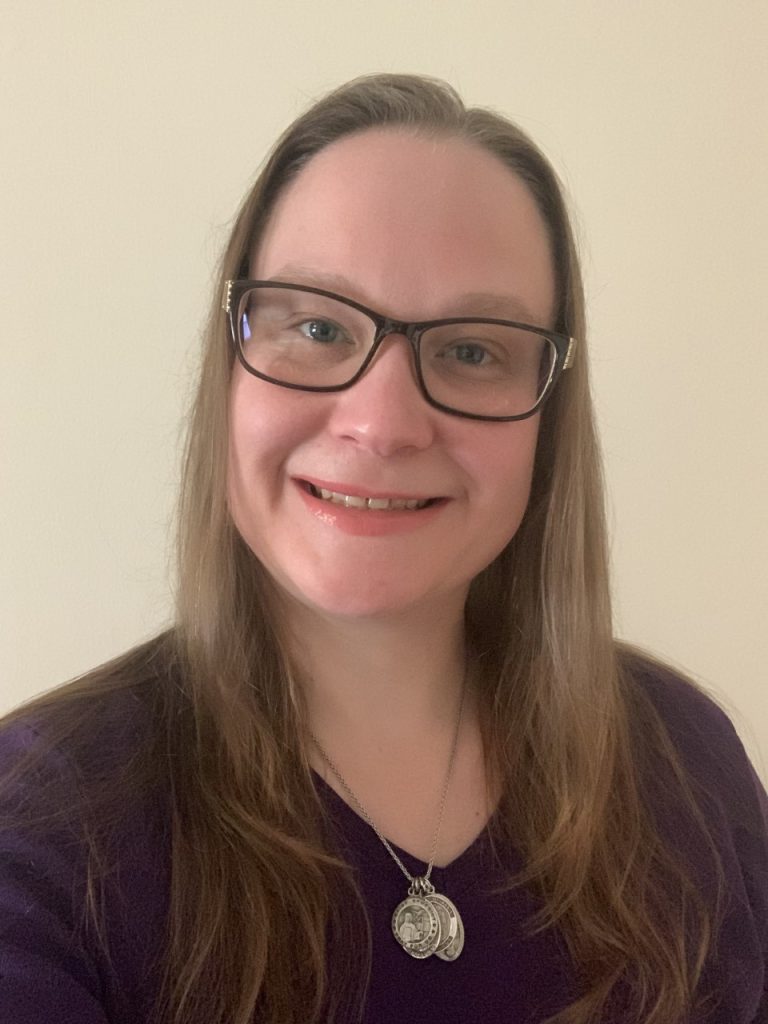From NASA to Corinthians: Sharon Gutkowski’s Career Journey
The Holy Child Network of Schools, of which Oak Knoll is a member, periodically request member schools to submit faculty profiles for their main website. We were excited to offer them this submission as it spotlights a fascinating career trajectory. Here’s our Q&A session with Oak Knoll Upper School Theology Teacher, Sharon Gutkowski.
 Sharon Gutkowski joined Oak Knoll School of the Holy Child in the fall of 2022. Her career trajectory is a fascinating example of left-brain/right-brain harmony and speaks to the fact that science and religion can not only coexist; they can complement each other.
Sharon Gutkowski joined Oak Knoll School of the Holy Child in the fall of 2022. Her career trajectory is a fascinating example of left-brain/right-brain harmony and speaks to the fact that science and religion can not only coexist; they can complement each other.
Gutkowski is a graduate of Seton Hall University, where she earned a Master of Arts in Theology and a Bachelor of Science in Physics and Philosophy. She earned a second Master of Arts in Theology from Villanova University, where she is currently completing her Doctor of Philosophy in Theology with specializations in biblical interpretation and Christian ethics.
She began her career at NASA Goddard Space Flight Center as an opto-mechanical engineer before transitioning into teaching middle school science and math. At Oak Knoll, she teaches 7th grade Religion and 10th grade Theology. She is a 12th grade advisor and facilitates the Rosary Beads for Unity Club and the Bible Study Club.
We sat down with her to gain a little more insight into her interesting marriage of disciplines.
Q: Tell us about your journey from engineering to teaching in a Catholic School
A: I grew up in New Jersey and attended public schools, so my first taste of Catholic school education wasn’t until I went to Seton Hall University. At the time, majoring in the STEM fields was especially popular, and there was a push to attract more women to these majors. I began my career working at NASA, which was a wonderful experience. I was grateful to have the opportunity to work with some of the best scientists and engineers.
Then, when I made the decision to relocate back to New Jersey, I decided to pursue a teaching career. I was always attracted to teaching based on all the great teachers I had over the years. So, I started out as a middle school science and math teacher. It was a joy to impart a wonder of learning and to witness the spark of understanding in students. I taught for around five years. Then, my husband joined the military and was eventually deployed. During that time of deployment, I found great comfort and support in our parish Church community and in attending Mass.
Through that time of introspection, I was drawn even more into my Catholic faith. I thought, “I’m really growing in my faith. I feel like I’m being called to study the Bible and to pursue a graduate degree in theology.” I wanted to expand on what I knew. I wanted to get more involved with the Church community, and I wanted to effectively teach the faith to my children. After I earned my master’s degrees in theology, I started as a substitute theology teacher at a local all-girls Catholic high school. This experience paved the way for me to come to Oak Knoll.
Q: What is the difference between teaching religion and teaching theology?
A: In grades 7 and 8, the religion classes introduce the beliefs and practices of the Catholic faith and how this faith is lived and shared. In grade 7 religion, students are introduced to the life and vocation of Cornelia Connelly, the founder of the Society of the Holy Child Jesus. Students also explore the mission of Jesus as well as the Catholic faith through the themes of identity, journey, and home.
In grades 9 to 12, the theology classes take deeper dives into the study of the Catholic Church and the Bible. Students further develop their analytical and critical thinking skills as well as their presentation skills. For example, in grade 10 theology class, there is a focus on the person of Jesus, the New Testament of the Bible, and the four marks of the church – One, Holy, Catholic, and Apostolic.
Q: Oak Knoll is a Catholic school that welcomes people from all faith traditions. How are your courses inclusive of other religions?
A: At its core, theology is an academic discipline that involves the study of God and the divine. The field of theology utilizes the inspired word of God in the Bible and sources such as scholarly texts from theologians and saints along with personal and communal testimonies of faith. These resources help the students understand various theological concepts, and they are motivated to analyze and reflect on what they’ve learned. The discussions in the classroom are very fruitful because there are a variety of perspectives. It is important to understand where the students are coming from and where they are going in their journeys of faith. They don’t necessarily have to believe and embrace the Christian faith in order to understand or discuss it. Just as if they were learning about any religion, students can relate the importance of the texts to believers, and the context allows them to intelligently discuss the belief system.
While there are academic discussions in the classroom, the practice of the Catholic faith is further exemplified in the school’s traditions, social teaching, and Holy Child Goals. The goals are reinforced in the classroom, but not in such a way where students need to be practicing Catholics. It’s not about trying to convert students; it’s about educating them to appreciate and discuss the Catholic faith and its tenets.
Q: Is there a particular chapter or phrase, or part of the Bible that most resonates?
A: I really love Paul’s letters, especially 1 Corinthians. This letter reveals how much Paul wants to help the Corinthian community. He wants the Corinthians to flourish and understand how God works in their lives. He underscores Jesus’ mission and wants to prepare them for Jesus’ second coming. Paul is very much a fatherly figure because he spends time teaching and guiding his communities.
One passage I really enjoy, 1 Corinthians 11:17-34, is about the Lord’s Supper. Paul writes about how he passed on the tradition of the Lord’s Supper to the Corinthians. He wants them to embrace this tradition, understand it, and realize its spiritual, communal, and divine significance. This passage is truly remarkable because its writing predates the writing of the Last Supper accounts in the Gospels.
Q: You are in the process of obtaining your Ph.D. Have you chosen a doctoral thesis?
A: Yes, I am concentrating on first-century hospitality in the Pauline letters. This involves having a good grasp of first-century hospitality practices in the Greco-Roman and Jewish cultural traditions. I consider how Paul practices hospitality, especially with his belief in Jesus.
Q: What do you mean by hospitality in this context
Today, most people associate hospitality with banquet halls, restaurants, hotels, and fancy dinners. However, Paul’s practices of hospitality in the first century were different because they relied more on the dynamic relationships between the host and guest. My dissertation investigates various themes that Paul used in his understanding of hospitality.
Q: How does the mission of Holy Child Schools resonate with you personally or professionally?
A: I really identify with the mission of Cornelia Connelly, which is to educate the whole child. I believe that Oak Knoll exemplifies being a school with purpose and exhibits a caring community atmosphere of people with purpose. When I think about Cornelia, her life, her faith journey, and her educational strategies, I can really appreciate how she endeavored to provide Catholic education, especially for women.
I also love that the tradition of the Holy Child Schools is a student-centered approach to education in a faith-filled way. This is a tight knit and very close community–steeped in tradition and values.






